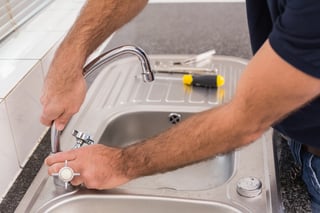 If you are interested in purchasing a fixer-upper property, you are probably excited and raring to go. However, you'll need to carefully inspect the home for potential problems so that you know what you are getting yourself into. A lot of issues aren't a big deal -- for example, many cosmetic issues can be fixed relatively easily and affordably -- but these are three inspection items you must not overlook when evaluating a fixer-upper. They're more serious problems that can be quite costly to repair, so you'll need to take that into consideration when determining whether or not to purchase a property.
If you are interested in purchasing a fixer-upper property, you are probably excited and raring to go. However, you'll need to carefully inspect the home for potential problems so that you know what you are getting yourself into. A lot of issues aren't a big deal -- for example, many cosmetic issues can be fixed relatively easily and affordably -- but these are three inspection items you must not overlook when evaluating a fixer-upper. They're more serious problems that can be quite costly to repair, so you'll need to take that into consideration when determining whether or not to purchase a property.
1. Plumbing Issues
If a fixer-upper has a lot of plumbing issues, this is not something that you should ignore. If the problems have been neglected for a long time, there could be extensive water damage, and mold and mildew could be a concern. Plumbing work can also be very expensive if a lot of it needs to be replaced.
2. Electrical Issues
Some people save money by fixing their investment properties themselves. However, one thing that you absolutely shouldn't try that with is electrical work, unless you have a lot of experience. Older homes sometimes require things like increased amperage, which can cost a couple thousand dollars. If the wiring is in poor condition, the home could be at risk of an electrical fire or could have other electrical issues if you do not replace it. Rewiring isn't something that you can really DIY, and it's very expensive.
3. Foundation Damage
Some foundation issues are not too costly to replace. However, if the foundation of the home that you're thinking about buying is in really bad shape, you could be in for more problems than you think. Repairing serious foundation damage can be very expensive. Plus, there are extra problems that you have to consider. If the house has shifted a lot, then doors might stick, windows might not open and close, walls could have cracks, and more. Make sure that you look out for these things before buying a fixer-upper, since the costs can add up more than you might think.
Just because a home has these issues does not mean that you shouldn't buy it as a fixer-upper. However, you should take these three issues particularly seriously, since they can be costly to repair. Your best bet is to do your research about how much these repairs will cost and to factor that in when determining if a fixer-upper is a good deal or not. You may also need to look for funding to help you pay for the project, but luckily, you can contact us for your hard money borrowing needs.











